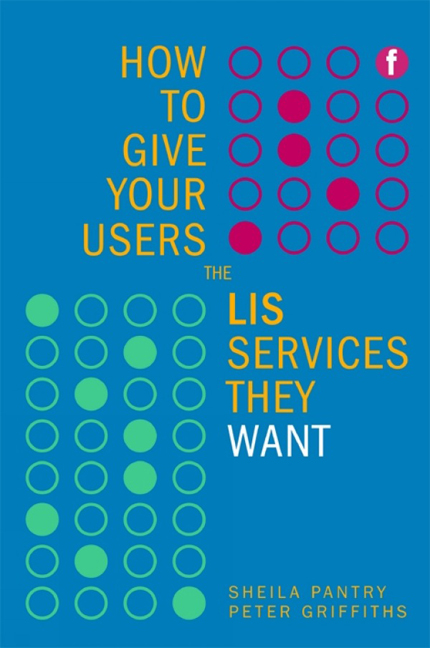Book contents
- Frontmatter
- Contents
- Preface
- 1 Why this book?
- 2 Understanding users – the what, why, where, when, how and who
- 3 What is the current knowledge about your users and their needs – is it really predictable?
- 4 Great expectations: how LIS professionals can manage and train users
- 5 Using information about past user behaviour
- 6 Making the most of knowing your users
- 7 Keeping track of changes in what users want
- 8 Tracking the future
- 9 Future perfect?
- Appendix 1 Reading list and references
- Appendix 2 Where to go for further information
- Index
6 - Making the most of knowing your users
Published online by Cambridge University Press: 08 June 2018
- Frontmatter
- Contents
- Preface
- 1 Why this book?
- 2 Understanding users – the what, why, where, when, how and who
- 3 What is the current knowledge about your users and their needs – is it really predictable?
- 4 Great expectations: how LIS professionals can manage and train users
- 5 Using information about past user behaviour
- 6 Making the most of knowing your users
- 7 Keeping track of changes in what users want
- 8 Tracking the future
- 9 Future perfect?
- Appendix 1 Reading list and references
- Appendix 2 Where to go for further information
- Index
Summary
This chapter looks at how you can improve your strategic planning through analysis of user behaviour by:
➡ making the link to strategic planning
➡ better marketing
➡ keeping the customers satisfied
➡ keeping upstream management satisfied
➡ making sure that your organization recognizes the importance of its library and information service
➡ communications
➡ achieving cost benefits and making better use of budgets.
Better strategic planning through analysis of user behaviour
Library and information services do not operate in ‘steady state’. They are – or should be – central to every organization irrespective of the field of activity (or ‘sector’ – by which we mean categories like academic, governmental, workplace, public, legal, financial, technical, scientific or medical). In order to remain in that central role they need constantly to be assessed, evaluated and monitored.
Making the link to strategic planning
It will be part of your strategic planning processes for the LIS to check for and evaluate the many new and competing services and products that constantly arrive on the scene. You should recognize that this is also part of your organization's strategic planning process, so user requirements should be kept in mind as part of your planning and evaluation processes. How can this be done?
Marketing is one way (and we discuss this in a moment) but it's also important to make the leaders of your user community aware of the assumptions or decisions you have made, and to share the information with them. This can be done succinctly – you have no need to go into every detail. In this way you can be sure that these decision makers have a summary of your evidence in front of them, and could ask for further information about particular issues of concern.
It is not among the main aims of this book to provide detailed guidance on the processes of strategic planning for libraries but there are a number of texts that provide further information (such as Corrall 2000 and 2003 or the documents on the web indexed from LibrarySupportStaff.com at www.librarysupportstaff.com/strategicplan. html).
- Type
- Chapter
- Information
- How to Give Your Users the LIS Services They Want , pp. 73 - 86Publisher: FacetPrint publication year: 2009



